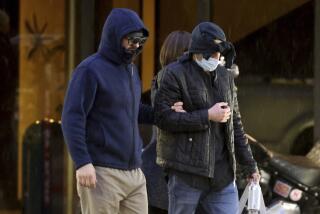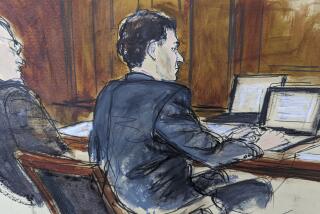Tapes of Alleged Silberman Dealing Heard
- Share via
Moments before he was arrested, San Diego businessman Richard T. Silberman was negotiating a deal to launder hundreds of thousands, perhaps millions, of dollars portrayed to him as the profits of Colombian cocaine deals, according to court testimony Wednesday.
Silberman, who already had directed two previous transactions, intimated just minutes before he was arrested in April, 1989, that he was seeking a big deal, according to secretly recorded tapes and the testimony of the key undercover FBI agent in the case.
Agent Peter Ahearn and Silberman haggled, however, over whether to structure the deal for $750,000 or as much as $1.3 million; they also haggled over the fee Silberman wanted to charge. But Silberman made it clear he wanted “to cut one deal with you, no little . . . ones,” according to a tape played Wednesday by federal prosecutors.
“These guys are gonna see, you know, one-three, seven fifty, you tell them what they wanna see, OK,” Silberman is quoted as saying on the tape. “And then we’ll cut the deal for that, cause I don’t want to get (cheated); gonna do it one piece at a time; you understand what I mean, cause at least then I know each piece gets there.”
Silberman, who once served as a top aide to former Gov. Edmund G. Brown Jr., showed no emotion as he listened to the tapes during the third day of testimony in the case.
He is standing trial on seven counts stemming from allegations that he laundered $300,000 characterized by Ahearn--who pretended to be Pete Carmassi, an agent of Colombian drug traffickers--as narcotics profits. Silberman was arrested April 7, 1989, in the hallway outside a Mission Bay hotel room immediately after leaving the negotiating session with Ahearn.
If convicted, Silberman could receive 75 years in prison. His trial before U.S. District Court Judge J. Lawrence Irving is expected to last six weeks.
In tapes played last week, prosecutors detailed the first of the two deals they contend form the basis of the case, a swap in late 1988 of $100,000 for stock in a Silberman gold mine firm. A few months later, Silberman proposed and directed the second transaction, an exchange of $200,000 for U.S. Treasury bonds, according to testimony presented Tuesday.
The value of the bonds, however, was as much as $50,000 less than Ahearn expected, according to his testimony. In negotiating the third deal, Ahearn insisted that Silberman reduce his fee to make up the shortfall, the agent said in a tape played Wednesday.
Silberman agreed that both men “were trying to clear up a mess,” according to a tape of the April 7 meeting.
He also explained what he had in mind for the money and how Ahearn could retrieve it. “What I would plan to do is to move, uh, from, uh, here, make one stop in Asia, then on to Europe, then it’s there and it’s all yours,” Silberman is quoted as saying.
A few minutes later, according to a transcript of the tape prepared by prosecutors, Silberman apparently inquired about the trustworthiness of an intermediary. “You mean the guy that we talk to, what’s his name? The guy that you said was a Colombian,” Silberman said.
Defense lawyers insisted that the quote really was: “You mean the guy that we talk to, the guy that? What’s his name?” Irving told jurors that they should rely on their own hearing to decide what came after the first part of the first sentence: “You mean the guy that we talk to . . . “
FBI agents allege that Silberman confessed immediately upon his arrest. But Assistant U.S. Atty. Charles F. Gorder Jr., the lead prosecutor in the case, did not go that far Wednesday, stopping his questioning of Ahearn after the agent said Silberman “never indicated” that outside coercion forced him into any deals.
Defense attorneys contend Silberman completed the second deal because an undercover informer in the case, convicted felon Robert Benjamin, threatened his wife, San Diego County Supervisor Susan Golding, and their children. Under cross-examination, Ahearn told defense lawyer James J. Brosnahan that he knew of no threats.
More to Read
Sign up for Essential California
The most important California stories and recommendations in your inbox every morning.
You may occasionally receive promotional content from the Los Angeles Times.













